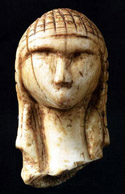Anthropology, Department of

Department of Anthropology: Faculty Publications
Document Type
Article
Date of this Version
2013
Citation
Wandsnider, LuAnn
2013 Public Benefactions in Western Rough Cilicia: Insights from Signaling Theory. In Current Research in Western Rough Cilicia, edited by M. Hoff and R. Townsend, pp. 170-181. Oxbow Press, Oxford.
Abstract
In the Hellenistic and Roman world of the eastern Mediterranean, Greek and Greco-Roman cities came to be defined by their physical cityscape. These buildings were constructed by specific city institutions, such as the council and the assembly, and financed through city funds, mass subscription and, importantly, public benefactions. Public benefactions, which also included support for festivals and competitions, were made by certain elite and usually wealthy individuals to the benefit of a defined community of citizens (and sometimes non-citizens, as in the case of fortification walls). Institutions within the benefiting community, again the council and the assembly, acknowledged these gifts with a published decree and inscriptions or statues situated in places of honor. Various scholars have commented on the appearance, form, and nature of the Greco-Roman cityscape in Anatolia. Here, I explore the utility of viewing this phenomenon through the lens of multi-level signaling theory. I suggest these public buildings constitute a conjoined individual-communal “signal” that relayed important information to attentive citizens, nearby cities, and agents of Rome. This signal synergistically satisfied four ends: the elite effectively and materially conveyed their hidden talents to a diverse community, establishing position in a dynamic hierarchy and winning various rewards for themselves and family; non-elite citizens learned of and could make decisions about which of various contenders for positions of authority to support; city institutions materially signaled their communal values, maintaining the support of the citizens in spite of increasing wealth differentials; and finally the city communicated to external audiences (other local cities, Rome’s client kings, and later agents of imperial Rome) its ability to mount significant collective actions, thereby remaining viable if not outcompeting other cities for access to contested resources.

